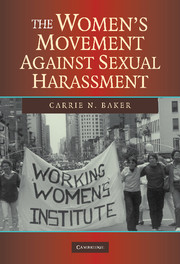Book contents
- Frontmatter
- Contents
- Figures
- Acknowledgments
- Organizational Abbreviations
- Introduction: Enter at Your Own Risk
- PART I RAISING THE ISSUE OF SEXUAL HARASSMENT
- PART II GROWTH OF A MOVEMENT AGAINST SEXUAL HARASSMENT
- PART III THE MOVEMENT'S INFLUENCE ON PUBLIC POLICY
- 6 Government Policy Develops
- 7 Fighting the Backlash: Feminist Activism in the 1980s
- 8 Legal Victory: The Supreme Court and Beyond
- Conclusion: Entering the Mainstream
- Appendix A Time Lines of Significant Events
- Appendix B Glossary of Select Cases
- Notes
- Bibliography
- Index
6 - Government Policy Develops
from PART III - THE MOVEMENT'S INFLUENCE ON PUBLIC POLICY
Published online by Cambridge University Press: 14 June 2019
- Frontmatter
- Contents
- Figures
- Acknowledgments
- Organizational Abbreviations
- Introduction: Enter at Your Own Risk
- PART I RAISING THE ISSUE OF SEXUAL HARASSMENT
- PART II GROWTH OF A MOVEMENT AGAINST SEXUAL HARASSMENT
- PART III THE MOVEMENT'S INFLUENCE ON PUBLIC POLICY
- 6 Government Policy Develops
- 7 Fighting the Backlash: Feminist Activism in the 1980s
- 8 Legal Victory: The Supreme Court and Beyond
- Conclusion: Entering the Mainstream
- Appendix A Time Lines of Significant Events
- Appendix B Glossary of Select Cases
- Notes
- Bibliography
- Index
Summary
‘We've talked openly about battered wives and battered children. The next thing is battered office workers.’
Representative Patricia Schroeder, 1979In response to the growing movement against sexual harassment, federal, state, and local governments began to take action to combat sexual harassment. The first congressional hearings on sexual harassment in 1979 generated major press coverage and resulted in three important federal initiatives. A broad array of women's organizations, including feminist groups, labor unions, and organizations representing women of color and blue-collar women, participated in public hearings and submitted comments on policy proposals. These activists helped shaped the public discussion and the developing government policy on sexual harassment. Government officials usually took the issue seriously, expressing strong disapproval and developing remedies for victims of sexual harassment. The resulting federal guidelines on sexual harassment had a significant impact on subsequent court decisions. But perhaps most significantly, government initiatives against sexual harassment legitimized the issue and further raised public awareness of the problem.
FEDERAL POLICY
Federal initiatives to study and prevent sexual harassment in the late 1970s were inspired by publicity generated from several high-profile sexual harassment scandals in the District of Columbia government. In the spring of 1979, the Organization of Black Activist Women, which had earlier filed an amicus brief in the Williams case, encouraged women working for the city to speak up about sexual harassment. After several city employees filed complaints, D.C. Mayor Marion Barry appointed a Sexual Harassment Task Force, which was part of the D.C. Commission on Women. The Task Force sponsored several meetings and forums to raise awareness and develop strategies to address the problem, including conducting extensive surveys to document the incidence of sexual harassment. On April 4, 1979, shortly after the Task Force was formed, a D.C. grand jury indicted George R. Harrod, director of the D.C. Office of Personnel, for allegedly assaulting a female staff aide who was seeking to end a sexual relationship with him. Three weeks later, Judge Hart issued his decision in the case of Sandra Bundy. Although he declined to offer her any legal relief, Judge Hart found that D.C. Corrections Director Delbert Jackson and three other corrections officials regularly made improper sexual advances toward Bundy.
- Type
- Chapter
- Information
- The Women's Movement against Sexual Harassment , pp. 111 - 134Publisher: Cambridge University PressPrint publication year: 2007



